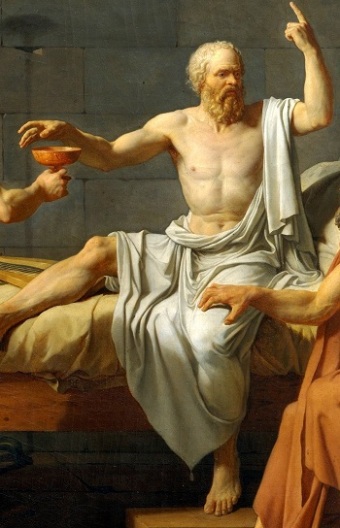Lost Café
Particles of melody drift easily
like veils of ash,
soft dust,
settling in napkin folds,
caught in timeless censure
where all things are possible.
Rhetoric raises ripples in the coffee
as cheeky sparrows swoop,
claiming the last crumbs of my daily bread.
The ripples surge to waves,
my cup jitters in its cradle,
debate, deliberation swerve
swiftly from side to side.
Socrates' spirit stalks this café!
The thrust and parry
of well reasoned, well seasoned
reasons,
stick like frescoes
to the blazing black walls.
Sensuous aromas seductively tease
the drip, drip of black gold
pushes anticipation to a pitch
more searing than the search for truth.
I ponder how many philosophers
have caressed the rim with their lips,
suckled inspiration
from this porcelain chalice,
in blazing white.
Then drifting like the music,
static for an instant's pose
they dissolve into the street's reality,
their exit a frantic gesture
to reclaim a position in the world.
But they return, always,
older, battle weary
disorientated, demented
shunned by supermarket trolls
flogged by incessant neon whips,
raped by chrome and vinyl style.
Their minds dragged into bondage
at multinational fast-food chains
where coffee is served instant,
in an instant
with trans-Atlantic instant speak
and programmed instant smile,
where excellence means mediocrity.
Oh Socrates!
Was your hemlock draught in vain?
like veils of ash,
soft dust,
settling in napkin folds,
caught in timeless censure
where all things are possible.
Rhetoric raises ripples in the coffee
as cheeky sparrows swoop,
claiming the last crumbs of my daily bread.
The ripples surge to waves,
my cup jitters in its cradle,
debate, deliberation swerve
swiftly from side to side.
Socrates' spirit stalks this café!
The thrust and parry
of well reasoned, well seasoned
reasons,
stick like frescoes
to the blazing black walls.
Sensuous aromas seductively tease
the drip, drip of black gold
pushes anticipation to a pitch
more searing than the search for truth.
I ponder how many philosophers
have caressed the rim with their lips,
suckled inspiration
from this porcelain chalice,
in blazing white.
Then drifting like the music,
static for an instant's pose
they dissolve into the street's reality,
their exit a frantic gesture
to reclaim a position in the world.
But they return, always,
older, battle weary
disorientated, demented
shunned by supermarket trolls
flogged by incessant neon whips,
raped by chrome and vinyl style.
Their minds dragged into bondage
at multinational fast-food chains
where coffee is served instant,
in an instant
with trans-Atlantic instant speak
and programmed instant smile,
where excellence means mediocrity.
Oh Socrates!
Was your hemlock draught in vain?

The Death of Socrates [detail] -- Jacques Louis David
As sculptor Constantin Brancusi said about Sokrates, the son of a stonecutter, "His eyes are in his ears, his ears are in his eyes." According to Platon, his mentor learned rhetoric from Aspasia of Miletus (the lover of Pericles) and erotics from the priestess Diotima of Mantinea. At least 3 comic playwrights claimed that Sokrates had helped Euripides write his plays, while Aristophanes himself lampooned the young philosopher in 3 of his comedies, "Clouds" (423 BCE), "Birds" (414 BCE), and "Frogs" (405 BCE), in which he complained about his bad effect on the youth of Athens and his neglect of the poets -- though Platon, who was 25 when the court condemned Sokrates to poison himself, was a noted poet himself; when Sokrates was being tried at 70 for corrupting young people, he claimed that the playwright was more dangerous than the 3 men who brought charges against him because he had poisoned the jurors' minds when they were young. In 404 BCE the dictatorial
ReplyDelete"Thirty" tried to forbid him from speaking to men under 30. At his trial in 399 BCE he insisted that he had never deliberately corrupted young people, but if he had done so unwillingly he should be instructed, not prosecuted. During his defense he frequently harangued the jurors for interrupting his discourse. After his condemnation he suggested that his friends be allowed to pay a fine of 30 minae, which was 6 times his net worth [a mina was worth 70 drachmae; 1 drachma was worth 6 obeloi, the smallest Athenian currency) but the jury sentenced him to death. Sokrates reflected that his end might be either a dreamless sleep or an opportunity to converse in the underworld. A day or so before his sentence was to be carried out he rejected an offer to escape, claiming that to illegally exile himself even after he had declined to do so lawfully would inflict harm on his society, thus confirming the jury's judgment. He spent his last day as usual, engaged in philosophical conversation and argumentation, telling his friends, “If you take my advice, you will give but little thought to Socrates but much more to the truth. If you think that what I say is true, agree with me; if not, oppose it with every argument.” He bathed at the prison’s cistern so the women of his household would be spared from having to wash his corpse. Then he swallowed the hemlock and died.